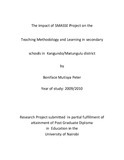| dc.description.abstract | The government of Kenya recognizes the important role science and mathematics should play in the realization of vision 2030; to become a globally competitive and prosperous country by 2030. This has been reflected in the amount of resources both human and otherwise that are channeled towards enhancing the teaching and learning of science and mathematics at all levels of the education system. At secondary school level, there have been a number of intervention strategies that the government has put in place to ensure effectiveness in the teaching/learning of these subjects. In addition to strategies such as: providing schools with qualified mathematics and science teachers and improving their remuneration and terms of service; providing schools with science equipment and even constructing laboratories, the government has also institutionalized In-service Education and Training (INSET) of serving science and mathematics teachers under Strengthening of Mathematics and Science in Secondary Education (SMASSE) project and quite a substantial amount of the Ministry of Education’s budget goes towards this course (MoE, 2005). SMASSE is a Technical Cooperation initiative between the Governments of Kenya and Japan signed in 1998 for purposes of implementation of the project.
This study discusses SMASSE; the initiative/agreement in terms of its development and gains so far made in upgrading mathematics and science teachers’ skills for improved/enhanced classroom delivery of lessons in Matungulu/ Kangundo Districts. Also included in the discussion are some of the mechanisms that have been put in place for the smooth implementation, administration and sustainability of the SMASSE project. One of the mechanisms is the sensitization workshops for education managers such as principals of schools, Quality Assurance and Standards Officers (QASO) and District Education Officers (DEO). Another mechanism is monitoring and evaluation which has revealed some of the successes of the project. The study concludes by examining the future of SMASSE which clearly lies partly in continued enhancement of the capacity for educators in Matungulu /Kangundo Districts.
v
The purpose of this study was to find out the effect of SMASSE training of teachers on performance of students in Maths and Science. The study was carried out in Kangundo/ Matungulu District Secondary Schools. Survey research design was adopted. To obtain the study sample, proportionate stratified random sampling was used.
The independent variables were classification of schools and attendance of SMASSE training. Dependent variables on the other hand were KCSE Maths and Science mean scores, attitude of students towards Maths and Science, attitude of teachers towards teaching Maths and Science and attitude of teachers towards the organization of SMASSE training. Data was collected using questionnaires, interviews and document analysis. Respondents were; Maths and Science teachers, Head teachers and students. Data was analyzed using both descriptive and inferential statistics.
The study found that there was a slight improvement in KCSE Maths and Science performance and a positive attitude of both students and teachers towards Maths and Science. However the attitude of students was weak. The study recommended SMASSE training of teachers who did not attend the full training and promotion of favorable attitudes of students towards Maths and Science. | |

